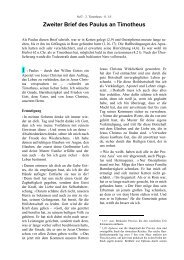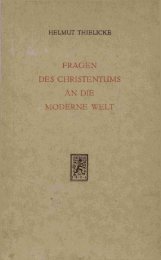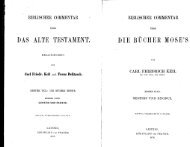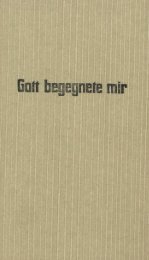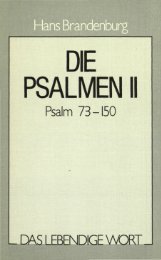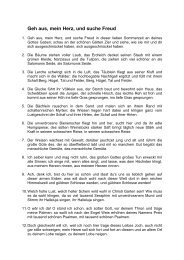You also want an ePaper? Increase the reach of your titles
YUMPU automatically turns print PDFs into web optimized ePapers that Google loves.
TEKEL, PARSIN. This is what these words mean:<br />
God has numbered the days of your reign and<br />
brought it to an end. You have been weighed on<br />
the scales and found wanting. Your kingdom is<br />
divided and given to the Medes and Persians”<br />
(Dan 5:24-28).<br />
The Bible mentions only one case of Jesus writing,<br />
when an adulterous woman was brought to<br />
Him: “But Jesus bent down and started to write<br />
on the ground with his finger” (John 8:6, 8). God<br />
and Jesus both wrote with their fingers!<br />
Various writing systems have been devised by<br />
man, who is now able to record thoughts and<br />
ideas. The invention of writing is one of the<br />
greatest achievements of the human intellect.<br />
The human memory span is brief and the storage<br />
capacity of the brain, though vast, is limited.<br />
Both these problems are overcome by recording<br />
information in writing. Written information can<br />
communicate over vast distances; written<br />
records may last for many years, even centuries.<br />
Only nations possessing the skill of writing can<br />
develop literature, historiography, and high levels<br />
of technology. Nations and tribes without writing<br />
are thus restricted to a certain level of cultural<br />
development. Written language offers the possibility<br />
of storing information so that inventions<br />
and discoveries (like medical and technological<br />
advances) are not lost, but can be developed even<br />
further.<br />
Like God, we are creative<br />
God created everything, and the results of His<br />
creative acts exhibit such advanced concepts that<br />
we stand amazed. Here also, His thoughts, as<br />
expressed in the works of creation, are very much<br />
higher than ours. One only has to consider the<br />
ingenious information storage system in DNA<br />
molecules, or the incomprehensible wonders of<br />
the brain.<br />
Like God, we are also able to create and to invent,<br />
although at a distinctly different level. Man’s<br />
creativeness – a gift of God – is obvious when one<br />
considers writing and literature, various technological<br />
achievements (like automobiles, computers,<br />
and moon rockets), as well as the multitudes of<br />
new ideas and solutions to problems.<br />
Like God, we can appreciate<br />
and create beautiful things<br />
In the Sermon on the Mount Jesus points out an<br />
important characteristic of his creation: “See how<br />
the lilies of the field grow. They do not labor or<br />
spin. Yet I tell you that not even Solomon in all<br />
his splendour was dressed like one of these”<br />
(Matthew 6:28-29). God made his creation aesthetically<br />
very pleasing. Just consider the rich<br />
colourfulness of blossoms, butterflies, beetles,<br />
birds, barracuda and other fishes, or the variety<br />
of forms displayed by snowflakes, flowers, or<br />
leaves.<strong>Our</strong> ability to appreciate form and beauty<br />
is also a gift of God, as is artistic talent. Some of<br />
us can create music, literature or paintings, while<br />
others can appreciate and enjoy these works of<br />
art. <strong>Our</strong> clothes, homes and gardens are not only<br />
chosen on practical grounds, but also for aesthetic<br />
reasons.<br />
Like God, we have our own will<br />
God’s will is mentioned very frequently in the<br />
Bible, the first time being “Let us make man.” This<br />
emphasises His will in creation. <strong>Our</strong> salvation is<br />
also grounded in God’s will: God “wants all men<br />
to be saved and to come to a knowledge of the<br />
truth” (1 Tim 2:4). Something of God’s free will is<br />
apparent in Romans 9:18, 21: “God has mercy<br />
on whom he wants to have mercy, and he hardens<br />
whom he wants to harden ... Does not the<br />
potter have the right to make out of the same<br />
lump of clay some pottery for noble purposes<br />
and some for common use?” Another important<br />
passage in this regard is 1 Corinthians 1:26-29:<br />
“Brothers, think of what you were when you were<br />
called. Not many of you were wise by human<br />
standards; not many were influential; not many<br />
were of noble birth. But God chose the foolish<br />
things of the world to shame the wise; God<br />
chose the weak things of the world to shame the<br />
strong. He chose the lowly things of the world<br />
103




